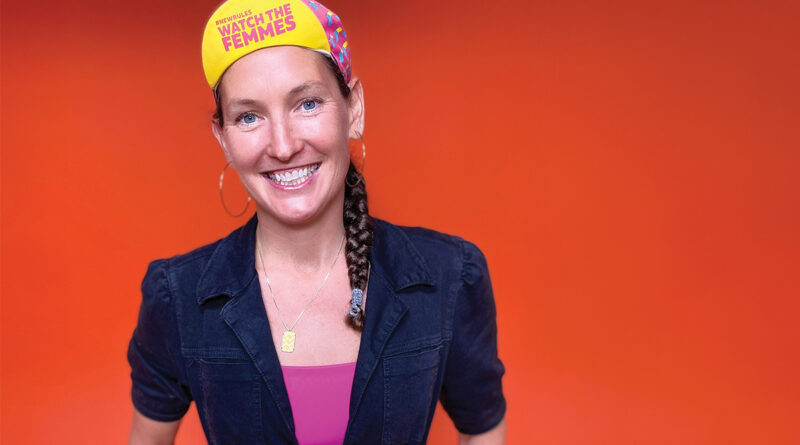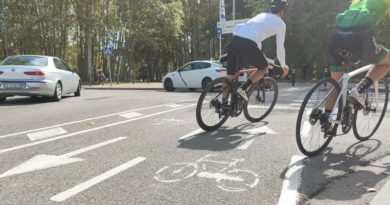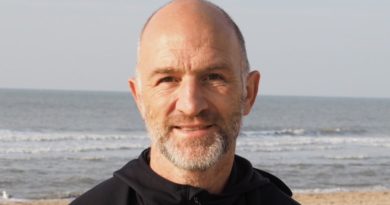INTERVIEW: Kate Veronneau, Zwift on Tour de France Femmes, data & diversity
Kate Veronneau, Director of Women’s Strategy at Zwift, joined the company to create a new pathway to professional cycling, specifically for women. Speaking with Danielle Reiff-Jongerius in the latest of her articles for CIN, Veronneau explains how cycling has lagged behind other sports like tennis and football and how the Tour de France Femmes avec Zwift is helping make women racing bikes a normal part of the landscape for younger generations…
For this series of articles I am continually seeking exchange and conversation with women working in the cycling industry. While brainstorming in the office, my male colleagues instantly said I should absolutely talk with Kate Veronneau at Zwift. Learning Kate’s job title, it was clear – her work deserves attention. Kate has forged an unmatched career in sports that spans from the real world to the metaverse and back. A college basketball player, Ivy League Rookie of the Year and captain at Brown University, Kate transitioned
to cycling after college. A hobby soon turned competitive, and Kate found herself pursuing a career as a professional cyclist. Facing limited opportunities and investment in women’s pro cycling, Kate returned to the workforce.
Can you tell me about your role, Director of Women’s Strategy at Zwift, how did you come into this?
I originally came to Zwift to run the Zwift Academy programme, and the whole idea behind that was to create a new pathway to the pros, specifically for a woman cyclist. That was the original objective. I’ve written several of my own job descriptions over the years. I tend to go out to people and say: this is the value I think I can provide. The whole industry has been so male-dominated over the years that it’s like, they don’t know what they don’t know. I see in my day-to-day conversations and work, that there is an opportunity to connect with women in new and different ways. The industry has not always appreciated that.
What are your tasks and responsibilities?
In cycling, especially when we talk about the competitive sports angle of it, everything is basically constructed through a male lens. It’s my job to change that.
One thing we’ve really recognised as more women have been getting on bikes, is that there’s different barriers, challenges, preferences, behaviours, trends and needs for women cyclists. And as soon as we started to delve into that, we recognised that we could do better. So it’s my responsibility to keep asking, and show what else we can do. Zwift Academy really helped us build our women’s community. Zwift is its own metaverse, we can really interact with our consumers in a different way than the rest of the industry can.
What is Zwift’s objective with this position?
Closing the gap is the simple answer. See, from Zwift Academy we recognised early on the opportunity to create new programming, new pathways in that programme. The Academy got the entire community really close to what was happening in the world tour and at the highest level of the sport. But more importantly, it really shone a light on the challenges that women cyclists were facing to be professionals.
What was your number one learning from the wealth of data you have at your disposal?
I loved to discover that women took advantage of the social side of our platform way more than men. They took the opportunity to connect, whether it be just working it out together or supporting each other. Asking and answering questions on a Facebook Group. There’s so many touchpoints with our consumers that we get to get a real inside look at the women individually and this women’s cycling scene and what’s going on and where.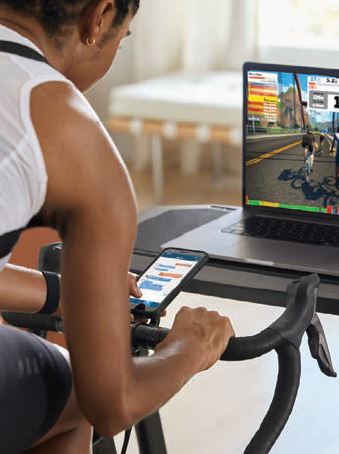
So, this data analysis is translated into a full-time job with finding partners, building community on the platform, building content on the platform that is specialised for women. We also take out some of the noticed challenges, like safety.
It’s super safe on Zwift, it’s efficient training and there’s always women to ride with. Unfortunately, those things don’t always come together in the real world.
What is your personal mission?
Bringing more people, but firstly women, to experience the profound joy and fitness that a bike can bring. The friends, fitness, adventures that come with a bike, being able to chase whatever bike dreams you might have. It really is something worth sharing to me.
What is the most challenging for women in the competitive sphere?
I think access to racing and support when you want to get into racing. It’s intimidating to get into racing. Understanding where to start, what you need… The whole competitive side of the sport is pretty complex and there’s not a ton of development teams (for women) out there. We are moving in the right direction. There’s a lot more opportunity nowadays in terms of media coverage, visibility, there’s broadcast, more sponsorship dollars, but it is still a fraction of the men’s.
Can you tell me about your personal experiences with this?
(Kate shows me a picture of her playing basketball.)
I never really felt disadvantaged because of my gender in basketball. I played with the guys, I played with the girls. I played through college because there was opportunity. If I was good enough, I could have gone to the WNBA. There was no limit, the path was clear. And then I get into cycling in my mid to late twenties and I’m like, what the hell is going on here?
Trying to race at the pro level, it felt like a time warp, like we went back 20 years in sports. Tennis, football, other women’s sports had progressed so much since then. I was just floored by just how much inequality there was, lack of opportunities.
It amazed me. And this is why I have so much respect for the women that have been doing it for so long because they show true perseverance.
Do you think sponsorship still overlooks the potential that they have with women or girls at a young age?
Danielle, I would sponsor a woman every day of the week over a guy because in my experience women have over-delivered on any kind of contractual obligations, always. Women are incredible word of mouth marketers. They’re very savvy on social media. They take all and any opportunity very seriously – they’re just really wonderful ambassadors for
the sport and for your product, for your brand. These are really exciting relationships – plus – they have always had a great return on investment to show.
How can we level the playing field?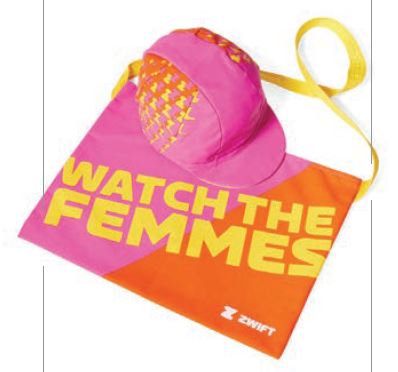
The industry is built on sponsorship. I think what the industry can do is ensure that you’re equally investing. Look for new opportunities to get behind athletes that are working hard to pave their way and are also bringing others along with them. There are so many programmes out there, really doing everything they can to make cycling more inclusive and
equal and give women the support they need to chase their goals. If a brand actively looks for this, you’re taking the right steps already.
What do you see as the number one topic men need to be made aware of, when it comes to women in cycling?
Funny enough I think the answer for me is awareness itself. I don’t think that very many men are aware of the fact that it is as unequal as it is. And yes, we are making great progress, but we’re really far from equality still.
I want them to think of their partners, their daughters, their mothers, their sisters and think about what they can do, whether it’s when you’re watching Flanders, you’re watching both races that weekend. Are you making your local ride inclusive to women? That’s when you’re truly helping out and are starting to change matters. If guys pitched in, we would be a lot further along.
What they can do starting today, is checking themselves a little bit and thinking about just the little things you can do on a daily basis, whether it is just following women’s teams or putting your money behind companies that are supporting the growth of cycling, making commercial decisions that support the future of the sport – holistically, or infrastructure – equally.
Many men just have not encountered the same friction, resistance or challenges as women have. Until you’re made aware of it, you’re just kind of going about your day. I want to point out that there are men in the industry that get daughters or nieces into cycling; then they really start to see it and they become the biggest advocates. This is a big help. We can’t just do it on our own. We need advocates and allies.
That brings me to another question: Who are your role models or mentors?
Billie Jean King, number one. Just seeing what she did, when she did it. Pioneers like her – absolutely inspiring. Secondly, the racers and the women working in the sport of cycling for all these years without a lot of visibility or sponsorship dollars. Done out of passion and love. Third: Anthony McCrossan from Cyclevox. He has been talking about women cycling way before anybody was listening, and I’m so happy and grateful to him for that. I hear his voice and it’s like the soothing sound of Anthony and it makes me happy because he also knows so much about the women’s peloton. He brings so much flavour to the commentary on broadcast. The backstories are so good in women’s cycling; he always has an eye and ear for that. And then last but not least: So many women just working in this sport that had to do three times the job of the men sitting next to them, are my role models. They know who they are, if they should read this.
What advice would you give people new to the cycling industry having just landed their first job?
Firstly: Be bold. Don’t be afraid to speak your mind. For me, it felt risky at times, but I wouldn’t be sitting here if I didn’t do that quite a bit. Don’t be afraid of uncomfortable conversations; point things out.
Secondly: Surround yourself with mentors and people that you can look up to, people that you can get feedback from, you know, at different points in your career. This has certainly helped me a lot and still does.
Thirdly: Find women in other industries. To me, these were helpful role models, too.
Fourth: Find your male allies too, because the male allies are necessary for change and growth in the industry.
Fifth: Pay attention and educate yourself on history. Educate yourself what little things we could do, learn from other sports and industries.
Anything else that you feel that you really want to say, when it comes to women in cycling?
I’m so optimistic about the future of women’s cycling. But I also recognise we have a lot of work to do. Each of us can do something in our roles, with our skills, in our community, with our dollars. So, I think that it’s going to take that kind of consistent, intentional effort to keep this momentum going forward and we’re catching up very quickly.
Will having more women in leadership roles help to understand better what female target groups would need?
Yes, they’re just going to bring more perspective to the table. And that’s what this sport has been lacking. It’s such a beautiful old sport, however it’s rich history can also be its biggest barrier. The average cyclist is changing so fast, there’s so much to gain by having a wider perspective in the sport. That’s why I get so excited about the women’s side of the sport.
What are you most proud of?
My favourite part about the Tour de France Femmes avec Zwift is seeing the kids on the side of the road and knowing that seeing women race bikes is now normal to them. It gives me hope for the future. So, I think that honestly is what I’m most proud of. We’re helping give women racers the world stage that they deserve, and that is catapulting the sport forward. The fact that so many people did not know that there wasn’t a women’s Tour de France, and now they do.
DANIELLE REIFF-JONGERIUS
Growing up in Utrecht, one of the cycling capitals of the world, Danielle Reiff-Jongerius has used her bike to get to school since the age of five. In 2015 she founded her agency, 138, in Munich while pregnant with her second child and with the vision to build her business around her family. Together with her husband, Philipp, it was decided they would merge both their businesses and share workload, income and parenting tasks equally. Today, 138’s values are reflected in a steadily growing company that puts their team first, while offering their expertise in content creation, marketing, communication and change management support to a diverse array of clients. Find out more at 138alternatives.com
